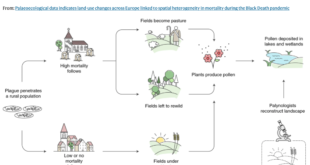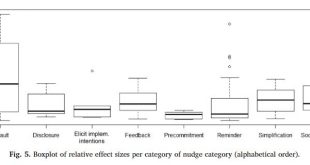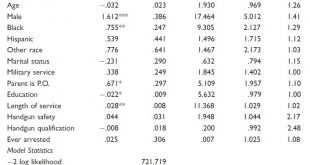Few doubt that the mid-fourteenth-century Afro-Eurasian plague pandemic, the Black Death, killed tens of millions of people. In western Asia and Europe, where its spread and mortality are best understood, upwards of 50% of the population is thought to have died within approximately 5 years. …The regionality of the plague’s mortality is particularly underexplored, owing to the availability of written sources and the limits of traditional historical methods. Here we pioneer a new approach, big...
Read More »IPA’s weekly links
Guest post by Jeff Mosenkis of Innovations for Poverty Action A very cool job market paper and explanatory thread, from Ph.D. candidate Matthew Klein. He, Bradford L. Barham, and Yuexuan Wu, link women’s household bargaining power to malaria rates in Malawi. They find that a one standard deviation increase in a woman’s household bargaining power implies a 40% reduction in chances that anybody in the household contracts malaria. They caution their ability to infer why this works is limited...
Read More »IPA’s weekly links
Guest post by Jeff Mosenkis of Innovations for Poverty Action. Two podcast recommendations: NPR has a new podcast, Rough Translation, from former East Africa correspondent Gregory Warner (web, Apple). It looks at how questions we deal with here play out differently in other cultures. The first episode looks at how Brazil ended up with race tribunals to evaluate who was Black enough to qualify for affirmative action. The second looks at fake news planted by Russia in Ukraine. The fun “Tell...
Read More »IPA’s weekly links
Guest post by Jeff Mosenkis of Innovations for Poverty Action. Two podcast recommendations: NPR has a new podcast, Rough Translation, from former East Africa correspondent Gregory Warner (web, Apple). It looks at how questions we deal with here play out differently in other cultures. The first episode looks at how Brazil ended up with race tribunals to evaluate who was Black enough to qualify for affirmative action. The second looks at fake news planted by Russia in Ukraine. The fun...
Read More »IPA’s weekly links
Guest post by Jeff Mosenkis of Innovations for Poverty Action. Two podcast recommendations: NPR has a new podcast, Rough Translation, from former East Africa correspondent Gregory Warner (web, Apple). It looks at how questions we deal with here play out differently in other cultures. The first episode looks at how Brazil ended up with race tribunals to evaluate who was Black enough to qualify for affirmative action. The second looks at fake news planted by Russia in Ukraine. The fun “Tell...
Read More »Shootings by Police Officers: Self-Control and More
I stumbled on a recent paper in the Police Quarterly entitled “Quick on the Draw: Assessing the Relationship Between Low Self-Control and Officer-Involved Police Shootings.” The authors are Christopher M. Donner, Jon Maskaly, Alex R. Piquero, and Wesley G. Jennings from Loyola, U of Texas at Dallas, U of Texas at Dallas and U of South Florida, respectively. Quoting from the paper: While the extant literature on police use of deadly force is voluminous, it is...
Read More »Men, Woman, Cooperation and the Gender Pay Gap
Here is a working paper by Leonie Gerhards and Michael Kosfeld entitled I (Don’t) Like You! But Who Cares? Gender Differences in Same Sex and Mixed Sex Teams. The abstract reads as follows: We study the effect of likability on female and male team behavior in a lab experiment. Extending a two-player public goods game and a minimum effort game by an additional pre-play stage that informs team members about their mutual likability we find that female teams...
Read More »Today’s Taboo, And Where to From Here?
Here is the abstract from a paper that appeared two years ago in Molecular Psychiatry: Intelligence is a core construct in differential psychology and behavioural genetics, and should be so in cognitive neuroscience. It is one of the best predictors of important life outcomes such as education, occupation, mental and physical health and illness, and mortality. Intelligence is one of the most heritable behavioural traits. Here, we highlight five genetic...
Read More » Heterodox
Heterodox



